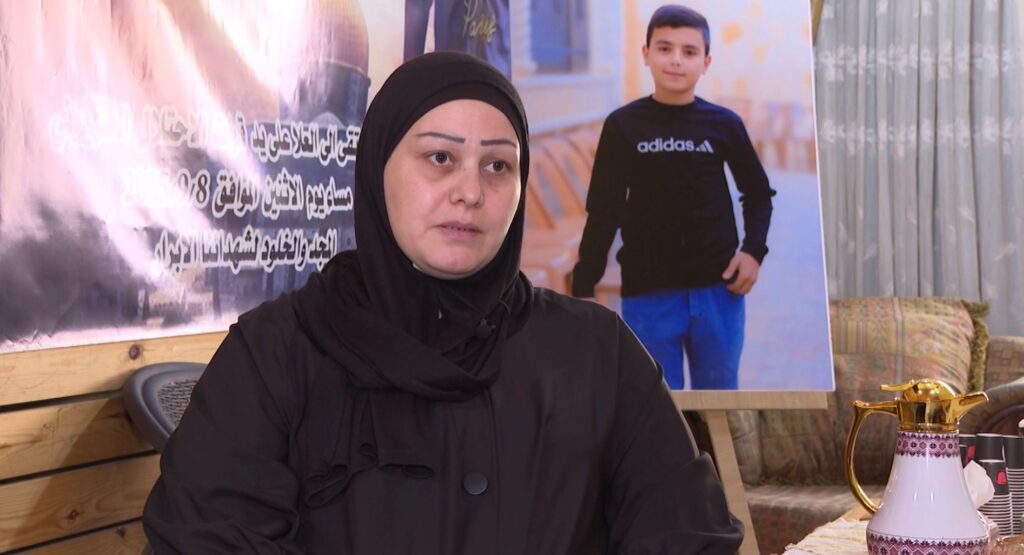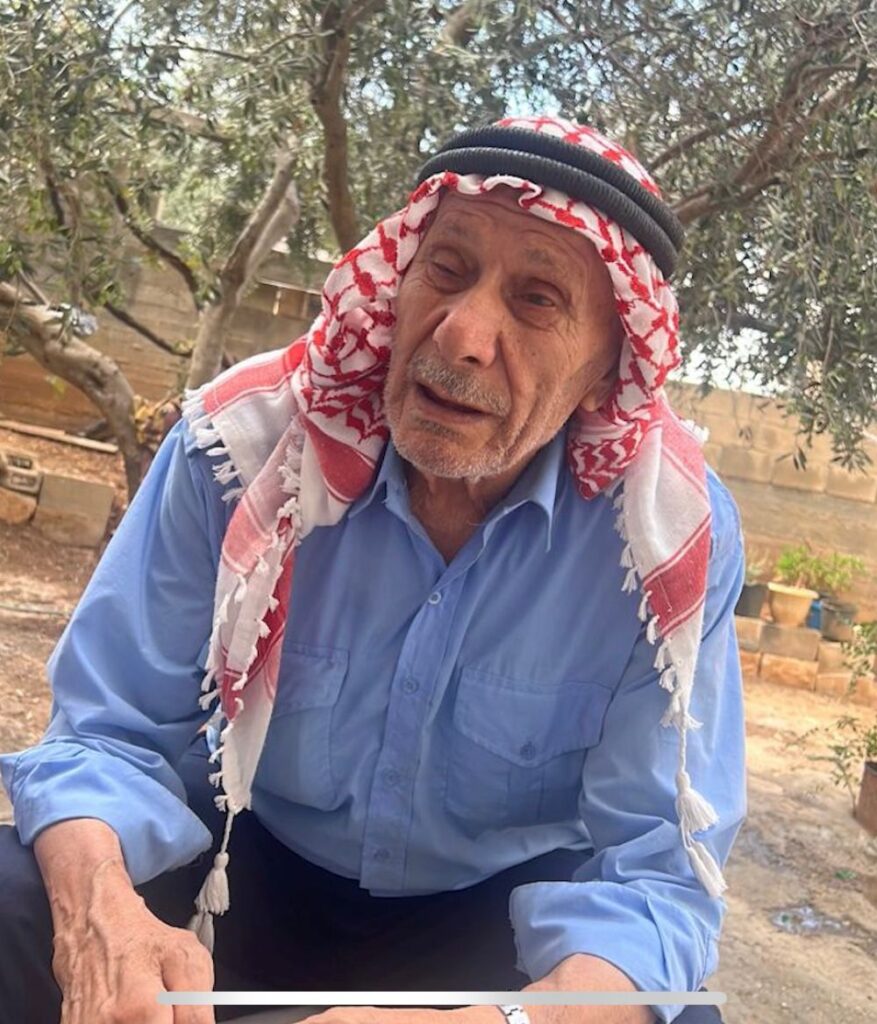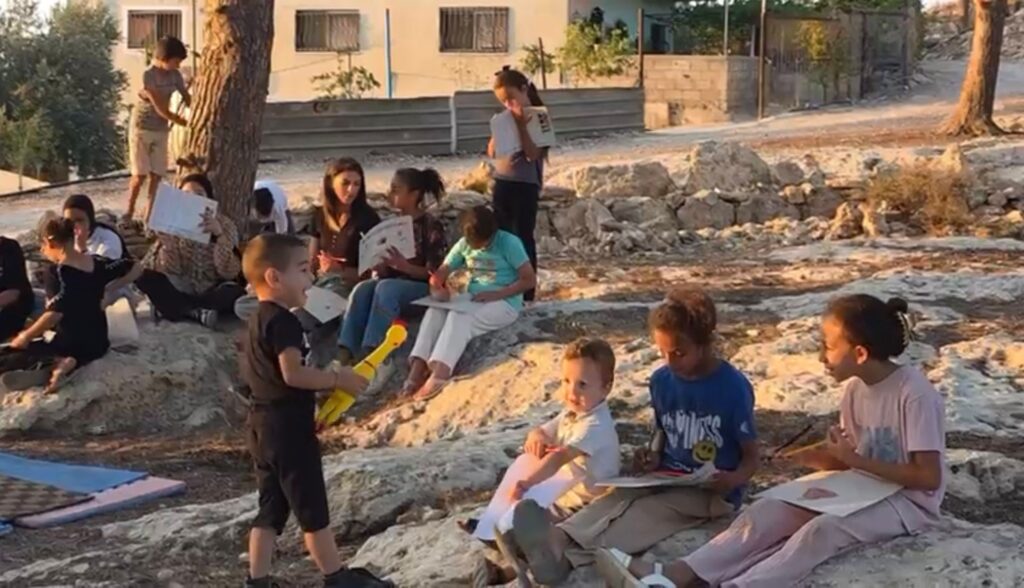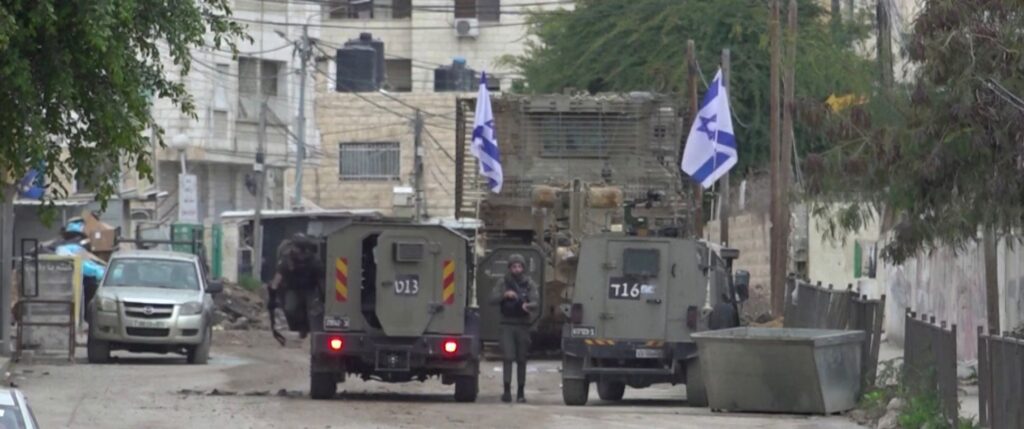
Jihan mourning the death of her 14 year old son at the hands of Israeli forces
September marks the start of a new school year. New beginnings and opportunities. But, not for 14 year old Mohammed in Jenin in the Occupied West Bank. His first day was also his last. Just hours after the school day, he was killed by Israeli occupation forces.
On Monday 8 September – around nine months since the beginning of the siege on Jenin refugee camp, word had spread that the army had withdrawn. A group of Palestinians tried to return but were met with two army jeeps full of soldiers that opened fire. Mohammed and another 14 year old boy were among them. Soldiers fired three bullets at Mohammed including one at his arm, another at his chest, the final bullet entered his abdomen and went through his back. Mohammed was rushed to hospital but stood no chance.
In Jenin, I met Mohammed’s mother, Jihan Nabeel Saeed, exactly a week after Mohammed was killed. Struck with grief she was barely able to speak.
“It was the first day back to school. I was waiting for him to come home to hear about his day, when I got a phone call that Mohammed had been hit. I rushed to the hospital but when I arrived they told me he was martyred.”
In January, around 21,000 people were forced under heavy artillery and fire to leave their homes in Jenin refugee camp. Jihan was left with no other choice but to move her family into their relatives house in Jenin, unsure if they will ever be able to go back to their own homes, and unsure if they even exist any more.
Israeli soldiers and illegal settlers have killed more than 1,000 Palestinians, including over 200 children, since 7 October 2023. On average, that’s one child every two days. I asked Jihan what her son was like.
“He was a boy who loved life. He had a lot of friends, and everyone loved him. This aggression must stop. Yesterday they killed my son, and maybe his friend will be tomorrow, and maybe his brother will be after him. We live in a life where no one is safe when they leave the door of the house. Even when we are at home, we are not safe. I can’t imagine my life without him. But this is our reality.”
Sat amongst Jihan and her other children it was clear that even in grief she had to carry on.
The Israeli military justifies Jihan’s killing with this; “A gathering of a number of suspects was identified in an area under an order prohibiting entry into it. The suspects approached in the direction of the force and constituted a threat to it. The troops embarked on the procedure for arresting a suspect, which includes opening fire to eliminate the threat.”
Back in the car, the story of 14 year old Mohammed’s death still raw, we drove down a bumpy road, turned rubble due to Israeli bulldozers that destroyed any semblance of a street. We were met at the top of the hill by Mohammed Qandeel who was waiting for us. He led us into his house where his elderly mother sat in tears still grieving her 86 year old husband Riyad Qandeel, killed by Israeli military forces last summer while on his way out to buy bread at lunchtime.

Riyad Qandeel, 86, killed by Israeli forces
The Israeli army is accused of shooting with an ‘intention to kill’. Snipers seemingly spare no one – regardless of age. In broad daylight, he was shot in the head and chest with 9 bullets, in what is described as a ‘deliberate targeted’ killing.
“My dad was just going out to get bread when he was suddenly shot in the head and chest with nine bullets. What we see is a deliberate killing machine. It can kill anything in front of it. Even an old, peaceful, innocent man. There is no justice. May God have mercy on him.”
Over a year has passed since he was killed, but Mohammed says the authorities have never given an explanation or even contacted them. He says that there is no justice. His mother sits weeping silently beside him as they relive the day.
On the outskirts of the city, we go to an activity club for displaced children. Some so young they are spared from the detail of horror, others old enough to fully understand. But all of them will endure long lasting impacts of the occupation.
Hiba Salem organises the meet ups. She is displaced herself, living in a tiny hut in the middle of the forest with 9 others including her children. She tells me she wants to encourage the children to express themselves, play and have rare moments of joy. “It is a small way to escape from the depression and free themselves from the terrible situation they are in,” she says.

Children’s activity camp
I left these children in the forest where they now are forced to live. In the distance, is the sun setting over what is left of Jenin Refugee camp. With the last minutes of sunlight they drew pictures of their homes that have been levelled to the ground, and killed family members that won’t be forgotten. While the occupation has destroyed so much it hasn’t destroyed their memories.
Death, destruction and displacement is not unique to Jenin. A similar beak picture is painted in two other refugee camps in the northern Occupied West Bank, in Tulkarm and Nur Shams. Israeli forces have sealed off entrances to Tulkarem, escalating a campaign of raids, arrests and collective punishment.
It comes as Israeli Prime Minister Benjamin Netanyahu pushes illegal settlement expansion. To date there are hundreds of illegal settlements all over the occupied west bank, nearly one million illegal Israeli settlers living in them and settler violence reaching unprecedented levels. Meanwhile land grabs and forced expulsions happen daily. The Knesset is accelerating legal frameworks to back plans to occupy the entire West Bank.
The Occupied West Bank is currently experiencing a de facto annexation. The Israeli military controls everything, from water supply, to work permits, to travel and movement. Along every single horizon illegal settlements and outposts are visible while thousands of Israeli flags fly all over Palestinian land. Across the region there are hundreds of checkpoints, as well as the near 800 km West Bank wall that surrounds it, restricting Palestinians’ passage, effectively turning it into an open prison.
In the market in Jenin a shop keeper told me:
“It’s a terrible situation. All we can do is die. They ruined our lives in every way. They killed our children and took away our homes. They don’t let us live or work. Economically, they killed us. There is no trade. Maybe death is better.”
This week the United Nations General Assembly saw western countries officially recognise the state of Palestine. A move aligning with the global majority that have relentlessly been campaigning on the streets to demand an end to the genocide in Gaza, and liberate the Palestinians under brutal occupation in the Occupied West Bank and Occupied East Jerusalem.
Whilst recognition is celebrated, is it too little too late?
Recognition, and recognition alone is not enough. As world leaders addressed the United Nations General Assembly with the official statements, Gaza was smouldering. In the same moments, Israel announced it had “successfully encircled Gaza City” meaning the incursion had reached another peak. Extra divisions and battalions have been deployed for the ground offensive while the heavy aerial bombardment of residential buildings forces hundreds of thousands of Palestinians in Gaza City south.
While Israel is becoming more isolated on a global stage, western countries have no claim to the moral high ground. As UNWRA’s Commissioner- General Phillipe puts it; “the recognition of a Palestinian State doesn’t mean much if there isn’t a ceasefire in Gaza.” At the moment nothing on the ground has changed. Ethnic cleansing is still in motion- the Gaza strip lies in ruins and Palestinian communities are being systematically erased in the occupied West Bank.
The international community has watched almost two years of Israeli genocide, which has killed at least 65,000 Palestinians, before voting in favour of a Palestinian state.
Netanyahu’s response is that there will be “no Palestine state,” much galvanised by the fanatical extremist far right in Israel who have long vowed it their “life’s mission to ensure a Palestinian state will never be created.” In fact, Netanyahu boasts under his leadership, illegal settlements in the Occupied West Bank have doubled and that the government will “continue on this path.”
The US cautions Israel against this path, while some western countries say annexation is a red line. But not one country has given a strong enough ultimatum, a threat or hint of punishment. Without serious punitive counter measures, nothing will get in Netanyahu’s way.
Resistance in the occupied territories is stifled. Protest action sees military soldiers and police arrive almost immediately, threatening force, and intimidating demonstrations. The risks are high, activists are silenced and gagged and even imprisoned.

Israeli military incursion into the occupied West Bank
For Jihan, who’s 14 year old son was shot dead on his first day of school, and Mohammed whose 86 year old father was also killed, as well as the displaced children of Jenin along with every single Palestinian, their very existence is resistance.
While the British establishment clamps down on the Palestine solidarity movement, Palestinians tell me some of the little hope they have left comes from the birds eye images showing the millions of people shutting down cities across Europe standing with Palestine.
Two years on, the world wide protest movement and its demands have forced global leaders to listen. But as it falls on deaf ears in Israel, the protests must continue to shout. All out on October 11.